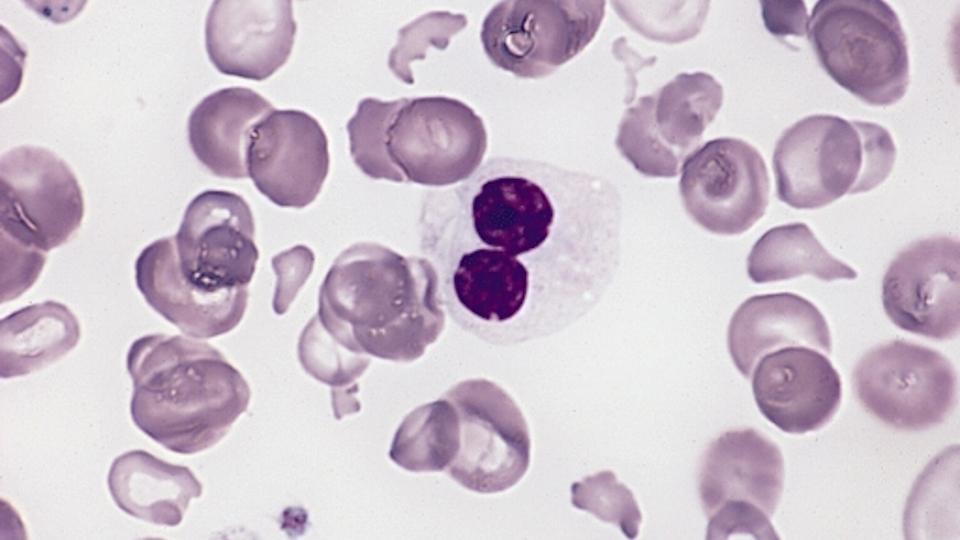ICER says Geron's just-approved Rytelo is too pricey

Blood smear from a person with myelodysplastic syndrome
Geron's first-in-class cancer drug Rytelo, recently approved by the FDA for myelodysplastic syndromes (MDS), is priced three to four times higher than it should be, according to the Institute for Clinical and Economic Review (ICER).
Rytelo (imetelstat) became the first drug that Geron had brought to market in its more than 30-year history when it was given a green light in June for adults with lower-risk MDS who have transfusion-dependent anaemia and have stopped responding to or cannot be treated with erythropoiesis-stimulating agents (ESAs).
The approval was based on the IMerge trial, which showed that Rytelo significantly improved the proportion of patients in this category who had no need for blood transfusions over a consecutive eight-week or longer period to around 40%, compared to 15% with a matched placebo.
The first-in-class telomerase inhibitor has since been launched in the US market at a list price of around $365,000 per year, with analysts at Evaluate suggesting that it could generate sales of $737 million in 2028. It has also been included in updated National Comprehensive Cancer Network (NCCN) treatment guidelines for MDS.
Now, the influential ICER has poured cold water over the company's celebrations with a report that concludes that the evidence behind Rytelo "is not adequate to demonstrate net health benefits for imetelstat added to best supportive care when compared to best supportive care alone."
Moreover, it also says that Rytelo would only meet its cost-effectiveness thresholds if its price was reduced to $94,800-$113,000 per year.
Despite its name, lower-risk MDS is a serious group of bone marrow cancers causing anaemia and increased risk of bleeding and infections, with patients often needing blood transfusions for hours a week. It can also cause organ dysfunction and cardiovascular complications, while the high number of transfusions can expose patients to adverse reactions from donor blood.
"While current data suggest that imetelstat may reduce or eliminate the need for transfusion in some patients, there is no evidence of its effect on the trajectory of MDS itself," said ICER's chief scientific officer Dan Ollendorf.
In an advisory committee meeting held in July, panellists voted 11 to four that there was not enough evidence to show a net health benefit when the drug was added to supportive care, and 15 to zero that there was no evidence that it was better than standard care plus Bristol-Myers Squibb's rival therapy Reblozyl (luspatercept), which has been cleared for lower-risk MDS since 2020.
Ollendorf also said the tolerability of Geron's drug is a concern, but "perhaps most importantly, the price set by the company is far out of line with the modest short-term benefit suggested by the clinical trials, especially given the uncertainty regarding those results. Such excessive pricing may in fact limit patient access to this new treatment option."
There's no sign that ICER's conclusions are being reflected in the take-up of Rytelo, at least at this early stage. In its second-quarter results call on 8th August, Geron said that 160 patients had been treated with the drug since launch, generating $780,000 in revenues, which chief executive John Scarlett said was "quite encouraging given the very early stage of this launch."
There are approximately 13,200 US patients with lower-risk MDS who need treatment for symptomatic anaemia, and approximately one in 10 are ESA-ineligible, suggesting a total target population of a little over 1,000 patients for Geron's drug.
Foster City, California-based Geron is also waiting for a verdict from regulators in Europe for Rytelo, and is testing the drug for myelofibrosis (MF), another form of bone marrow cancer, with phase 3 data due in 2026.
Public domain image from the Armed Forces Institute of Pathology (AFIP) via Wikimedia Commons











